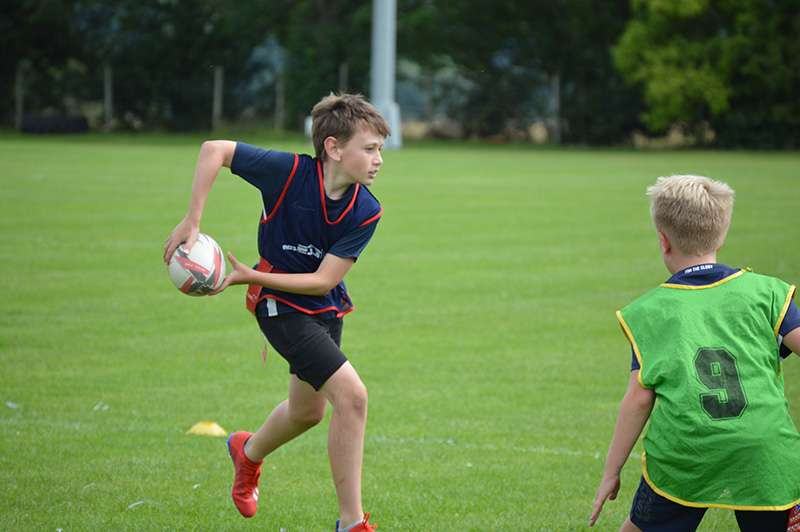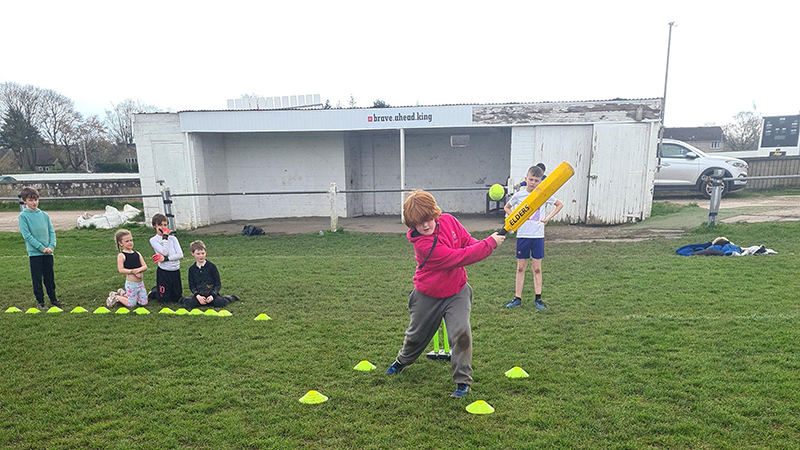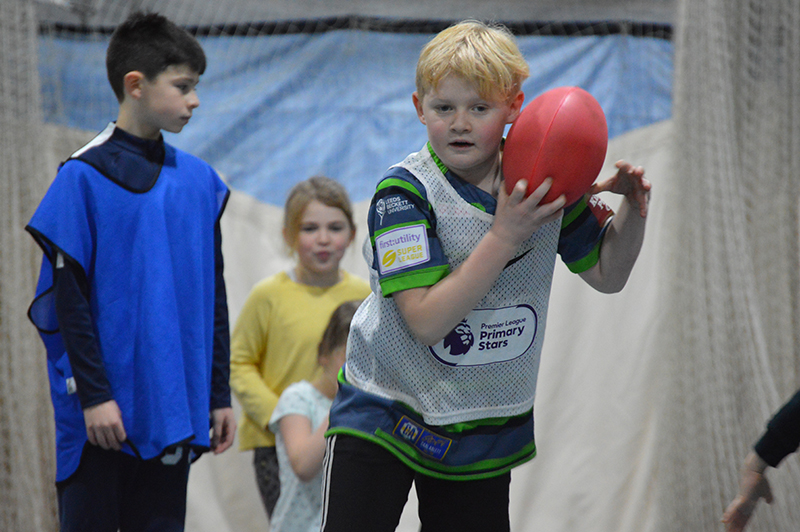Over the Easter holiday we ran again our Multi-sports camps at Baildon RUFC. The aim…

Guidance for parents and carers of children attending out-of-school settings during the coronavirus (COVID-19) outbreak
Published 1 July 2020, Department of Education
This guidance is for parents and carers and covers changes to after-school clubs, holiday clubs, tuition, community activities and other out-of-school settings for children and young people over the age of 5 during the coronavirus (COVID-19) outbreak.
These settings provide enriching activities that give children the opportunity to socialise with others outside their household and promote their wellbeing. We also recognise the importance of these settings in providing additional childcare options to parents and carers, particularly those with younger children, who may need to return to or continue to work during the school holidays.
Scientific advice suggests that there is a moderate to high degree of confidence that the susceptibility to clinical disease of younger children (up to age 11 to 13) is lower than for adults. However, it remains important that protective measures are put in place to help reduce the risk of transmission.
For older children, there is not enough evidence yet to determine whether susceptibility to disease is different to adults. Out-of-school settings may open to children and young people of all ages, and if you decide that your older child will attend an out-of-school setting you should still consider how to minimise any risk of infection that they may face. The risk can be minimised for children of all ages by ensuring that you are sending them to a provider that has coronavirus (COVID-19) protective measures in place, and taking practical steps to reduce the risk of your child coming in contact with someone who has the virus, such as encouraging your child to walk or cycle to the setting rather than taking public transport and discouraging them from mixing with different peer groups outside of the setting.
As these settings reopen, it is crucial that we are minimising the risk of transmission of the virus due to increased mixing between different groups of children. For this reason, you should consider sending your child to the same setting consistently.
We have released guidance for providers to help them put in place protective measures to reduce the risk of transmission of the virus. While some providers will be Ofsted registered, not all will be, and there is no single responsible body with complete oversight of these settings, or the quality and safety of their provision. With this in mind, you will want to check with the provider that they have put in place protective measures to reduce the risk of infection before you send your child to a particular setting.
Questions and answers
Q1. What activities and out-of-school clubs can my child attend?
As the Prime Minister confirmed in his announcement on 23 June, providers who run community activities, holiday clubs, after-school clubs, tuition and other out-of-school provision for children will be able to operate over the summer holiday with safety measures in place. Adjustments to the current measures for these providers are part of Step 3 of the government’s recovery strategy (from 4 July). Children will be able to attend settings such as tuition and learning centres, extracurricular clubs (such as ballet classes, gymnastics training, football coaching), uniformed youth organisations (such as Scouts and Guides), supplementary schools, private language schools and religious settings offering education (for example madrassahs, yeshivas, and Sunday schools).
Before the end of the summer term, while state schools in your local area are open, providers will only be able to operate for children from the eligible and priority groups; these are vulnerable children, children of critical workers and select year groups (early years, reception, year 1 and year 6). However, during the summer holiday period these settings can open to all children, provided they put in place the appropriate protective measures.
As more settings reopen, it is important that we continue to put in place ways to minimise the transmission risks of the virus. This means that you should consider sending your child to the same setting consistently, in order to prevent your child from mixing with multiple different groups of children.
We are recommending that providers keep children in small, consistent groups of no more than 15 children and one or two staff members. Group sizes may need to be smaller than 15 children depending on a number of factors such as age of the children in attendance, size of the premises or the type of activity. This means that when your child attends the first session they will be placed in a particular group or class of children and they should remain in that group for future sessions.
You are also advised to choose settings that are local to you. Where possible, parents, carers and children are encouraged to walk or cycle to the setting or to use a private vehicle. If you are using a private vehicle to take your child to an activity, you should avoid using it to take other children from outside your household to the same activity even if they are in the same small, consistent group. You are also encouraged to avoid using public transport to get to activities, particularly during peak times.
Anyone who has coronavirus (COVID-19) symptoms, such as a raised temperature, a new continuous cough, or a loss or change to their sense of smell or taste, should not attend an out-of-school setting and should follow the COVID-19: guidance for households with possible coronavirus (COVID-19) infection.
Children who are clinically vulnerable (but not clinically extremely vulnerable) are those considered to be at a higher risk of severe illness from coronavirus (COVID-19).
Very few children are clinically extremely vulnerable or live with someone who is clinically extremely vulnerable. The guidance for these groups is changing as the number of cases of coronavirus (COVID-19) declines in our communities. Read the latest guidance.
We are aware that some parents and carers may look to holiday clubs and out-of-school settings to offer respite childcare during the summer for children with special educational needs or with an education, health and care plan (EHCP). We have asked providers to ensure that making provision available and accessible to these children, as far as possible, remains a priority in these current circumstances.
Q2. The holiday club that my child attends has contacted me to say that they are reopening. What protective measures should I expect them to have in place?
Before the end of summer term, while schools are open in a provider’s local area, they should follow the same protective measures as schools to limit different groups of children mixing. This means that, if open before the end of term, they should ensure they are:
- only caring for children from the year groups and priority groups who are able to attend school
- only caring for children from one school or early years provider
- working closely with the school or early years providers that their children attend, to ensure that, as far as possible, children are kept in the same small consistent groups that they are in throughout the day and otherwise maintain social distance
For providers of out-of-school settings, like holiday or tuition clubs, that wish to operate over the summer holidays, the government has released protective measures guidance to help them put measures in place to reduce the risk of infection and transmission of coronavirus (COVID-19). When state schools in the local area have closed for the summer term, children of all ages and from multiple schools may attend these settings.
The type of protective measures specific providers put in place will depend on their individual circumstances, such as the type of the activity they offer (for example whether children will be moving around rather than sitting at desks), the size and layout of their premises, and whether the activity is being held indoors or outdoors.
The key measures that every setting should have in place are:
- minimising contact with individuals who are unwell by ensuring those who have coronavirus (COVID-19) symptoms do not attend their setting. This also applies if a member of their family has symptoms or if they have been advised by NHS Test & Trace as ‘a close contact’ to isolate at home
- encouraging staff and children attending to clean their hands more often than usual, including before and after activities and before and after using toilet/washroom facilities
- ensuring good respiratory hygiene by promoting the ‘catch it, bin it, kill it’ approach
- cleaning frequently touched surfaces more often than usual using standard products, such as detergent or bleach
- increased frequency of cleaning of toilets and washrooms
- minimising contact and mixing between groups of children by altering the environment to allow for social distancing between children and keeping children in small consistent groups
Before sending your child to a setting, you will want to ask providers what measures have been put in place to keep children, staff members and parents or carers safe, and any practicalities you need to be aware of such as collection and drop-off times and whether your child should bring their own water bottle or lunch to the setting.
Q3. What should I do if my child is displaying coronavirus (COVID-19) symptoms?
If your child becomes unwell with a new, continuous cough or a high temperature, or has a loss of, or change in, their normal sense of taste of smell (anosmia), they must stay at home and you should follow the COVID-19: guidance for households with possible coronavirus (COVID-19) infection guidance.
If your child becomes unwell while at a setting, the provider should call you immediately to come and collect them. While your child is awaiting collection they will be kept separately from others by a distance of at least 2 metres, ideally in a well-ventilated room with appropriate adult supervision. When you collect your child you should take them straight home; do not visit the GP, pharmacy, urgent care centre or a hospital. In an emergency, call 999 if they are seriously ill or injured or their life is at risk.
Your child should then self-isolate for 7 days and you should arrange a test for them as soon as possible to see if they have coronavirus (COVID-19). You can do this by visiting NHS.UK or contact NHS 119 via telephone if you do not have internet access. You and other fellow household members should self-isolate for 14 days.
If your child tests negative, they can usually return to the setting and the fellow household members can end their self-isolation subject to confirmation from local health protection professionals.
If your child tests negative but is unwell, they should not return to the setting until they are recovered.
If your child tests positive, NHS Test and Trace will speak directly to those that have been in contact with your child to offer advice. This advice may be that the rest of their class or group within the setting should be sent home and advised to self-isolate for 14 days. Household members should always self-isolate at home.
Q4. Can I attend an out-of-school setting to supervise my child during a session?
Out-of-school settings providers may not be able to accommodate parents and carers being present during a session due to guidelines on group sizes and social distancing.
Providers should be able to clearly communicate what protective measures they have put in place to minimise the risk to parents, children and staff in their setting by reducing the risk of transmission of the virus.
Some protective measures might limit parent and carer attendance. These may include:
- a limit of one parent attending the setting to drop off a child
- allocated drop off and collection times and the process for doing so
- protocols for minimising adult to adult contact, such as using physical distancing markers
It is good practice for providers to give parents and carers a parental consent form to complete when enrolling children in a setting so they have at least one emergency contact number for each child and are aware of any medical conditions or allergies. However, it is particularly important during the coronavirus (COVID-19) outbreak that you ensure the provider has your most up-to-date contact details in case of an emergency, such as your child falling ill with coronavirus (COVID-19) symptoms while attending the setting. You should also keep an accurate record of when and where your child attends out-of-school settings to help NHS Test and Trace identify people who may have been in contact with your child should they test positive for coronavirus (COVID-19).
If you are unable to supervise your child during a session, you will want to satisfy yourself that a provider has put protective measures in place to reduce the risk of transmission of the virus, as well as having adequate health and safety and child protection procedures. We have included checklists to support you when choosing a setting for your child in Annex A, below.
Annex A: Choosing a suitable provider
The information below provides some examples of positive signs to look out for to help you make good choices when choosing an out-of-school setting for your child, but this is not an exhaustive list.
All providers:
- health and safety has been considered, specifically coronavirus (COVID-19) protective measures. Providers with more than 5 staff members should have a written policy. Small and self-employed providers do not need to have a written policy but should be aware of the risks and how to reduce them
- the environment appears safe (it is a well-maintained, clean building with a clear exit route in case of emergencies and a first aid kit available). The provider knows what to do in the event of a fire or emergency
- rooms are well-ventilated, either by a ventilation unit or naturally (for example, open windows)
- soap or hand sanitiser is readily available for staff, children and parents or carers to clean their hands. The setting may also have posters promoting frequent handwashing or the ‘catch it, bin it, kill it’ approach
- the setting is cleaned frequently (for example, cleaning checklists in toilets are visible and completed regularly)
- use of toilets and changing rooms is managed to prevent overcrowding
- children attending the setting are in small, consistent groups of no more than 15 children and one or two staff members
- social distancing is promoted, through physical markers for instance
- an appointed person is responsible for first aid
- the provider has relevant training to deal with child protection and safeguarding issues (for example abuse and neglect)
- a child protection policy can be given to parents on request. This should say how children can report concerns and how the provider will make parents aware of them
- there is an appointed safeguarding lead
- a parental consent form, which asks for medical information and emergency contact details, is needed before the child attends for the first time
- a complaints process is in place
Providers with staff members:
- staff members and volunteers are aware of the new safety measures the setting has introduced during the coronavirus (COVID-19) outbreak
- staff members and volunteers have relevant training to deal with child protection issues such as physical, emotional or sexual abuse
- staff and volunteers have completed relevant qualifications and checks (for example pre-employment references, DBS checks and so on)



